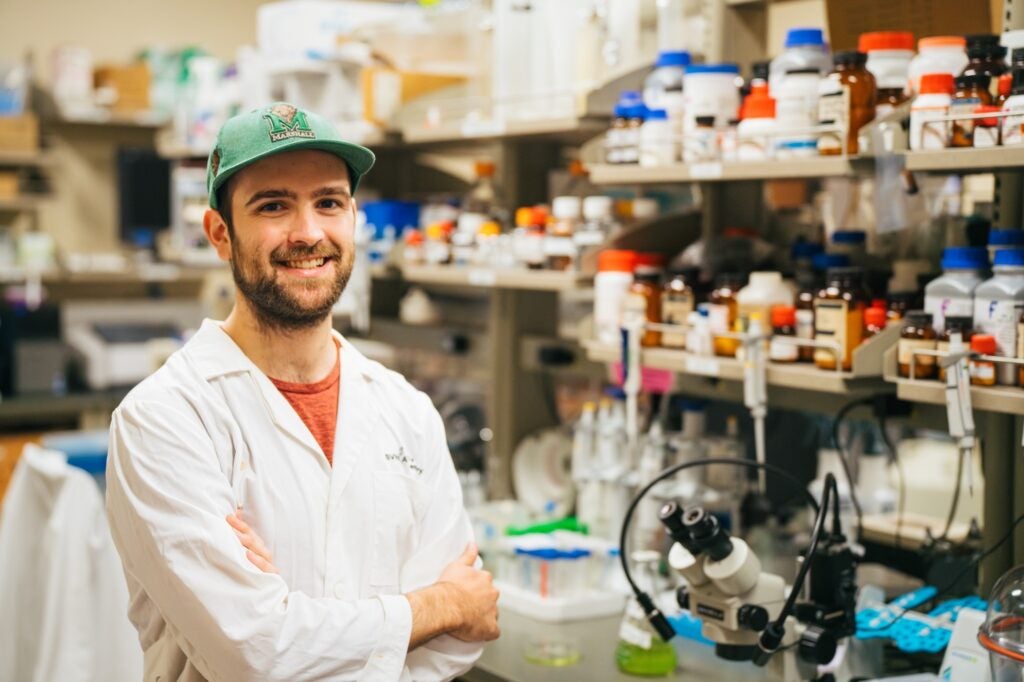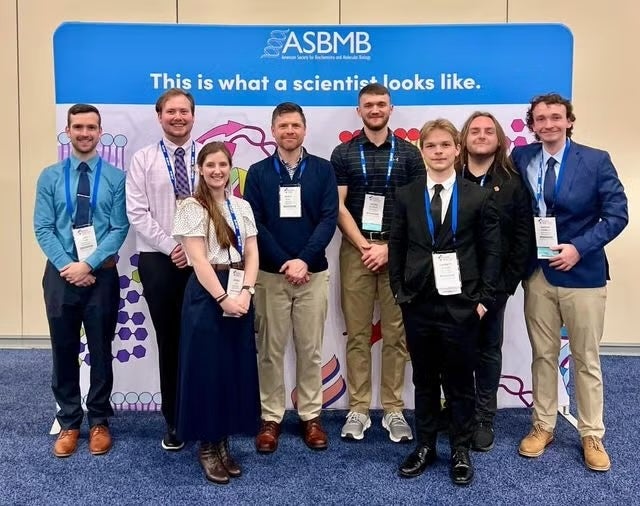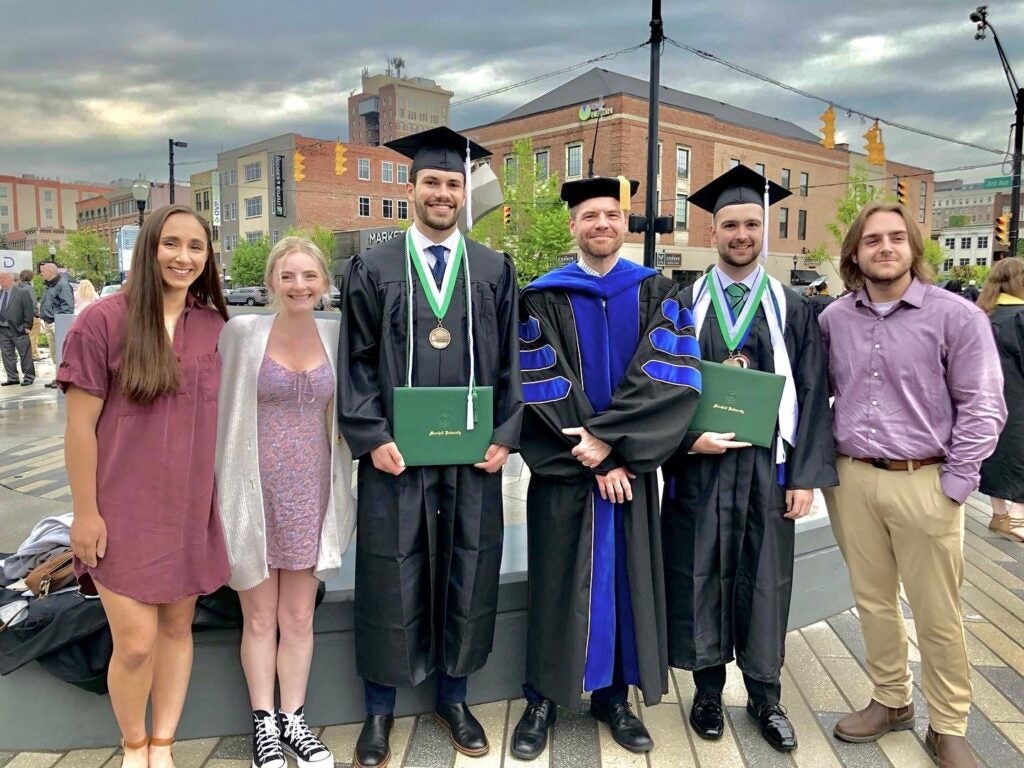Tardigrades, colloquially known as water bears, are eight-legged invertebrates that can be found almost anywhere on Earth and can adapt to survive extreme conditions. These fascinating creatures even make an appearance in Marvel’s Ant-Man and the Wasp.
“If there’s an extreme stress, they can go into a suspended animation,” Kolling said. “It’s quite like hibernation but not completely, and in some of those instances, they expel all the water in their bodies, and they shrink.”
The Kolling Lab at Marshall University began researching tardigrades in 2022 through a grant from the National Science Foundation (NSF) in collaboration with Marshall Chemistry Alumna Dr. Leslie Hicks at The University of North Carolina at Chapel Hill.

One outcome of the NSF grant is the “Tardigrade Trading Post,” an outreach project encouraging K-12 students to conduct experiments with and discover water bears in their own backyards.
The lab’s primary focus is understanding why tardigrades enter a hibernation-like state, called a “tun,” and how this state allows them to survive extreme conditions.
“When I was an undergraduate at Penn State, I had a really awesome undergraduate research experience and fell in love with doing research,” Kolling said. “We’re all scientists working together to find out novel things about the world and publish them, and I’ve been lucky to have a lot of great students.”
One of those great students is Mineral Wells, West Virginia, native Brendin Flinn.

Brendin chose Marshall University after he heard about the Thundering Word Speech and Debate team. He graduated from Parkersburg South High School in 2018 and began his undergraduate degree that fall, majoring in biology.
While he initially intended to apply to MD-PhD programs immediately after completing his undergraduate degree, an opportunity to work in Dr. Kolling’s lab changed his path.
Brendin worked as a graduate assistant in The Kolling Lab while he earned his master’s degree in chemistry.
In November 2024, Brendin successfully defended his thesis and was listed as the first author on a publication about tardigrades in the journal Scientific Reports.
“People know that tardigrades form the tuns under different conditions,” Kolling said. “But Brendin has done an exceptional job of measuring and describing the volume changes that occur when tardigrades form tuns.”
Additionally, Brendin was a contributing author on an article published in January 2024 in PLOS ONE, which demonstrated that the tun state in tardigrades is influenced by reversible chemical changes in specific proteins.
The practical implications of The Kolling Lab’s research are significant. Findings could address biotic space travel, drought-tolerant crops, and potentially mitigating age-related illnesses.

Brendin and six lab members presented their research at the American Society for Biochemistry and Molecular Biology Annual Meeting in 2024.
In the summer of 2024, Brendin began an eight-year MD-PhD program at Vanderbilt University. MD-PhD programs train physician-scientists, enabling them to complete both medical and graduate research degrees, preparing them for careers that combine research and clinical care.
“I’m really leaning towards the research side, but I don’t want to find myself in a place where I feel kind of disconnected from the people that I’m trying to help,” Brendin said.
Reflecting on his time at Marshall, Brendin credited Dr. Kolling’s mentorship for his success.

“The intellectual freedom he allowed me was great, but beyond that, he gave me a lot of career-oriented advice,” Brendin said. “He had a unique insight because he was my very first chemistry instructor. He followed me from day one at Marshall all the way to my last day, graduation.”
Brendin’s experience in The Kolling Lab wasn’t his first venture into research.
As an undergraduate, Brendin received a $5,000 research grant from the NASA West Virginia Space Grant Consortium through Marshall’s Undergraduate Research Fellowship Program. His research focused on understanding how epicardial fat influences cardiac function, especially in the context of coronary artery disease.
Brendin also received an Undergraduate Creative Discovery and Research Scholar Award from the Marshall University Research Corporation for his work titled: A Proposal to develop a Deployable Remote Online Network Evaluator (D.R.O.N.E). He also participated in a summer research program through the American Heart Association and the Joan C. Edwards School of Medicine.
Brendin highlighted the unique opportunities available at Marshall, particularly since The Kolling Lab is composed of mostly undergraduate researchers.
“We have so many undergraduate students in labs, which is not the case at other institutions,” he said. “At larger institutions, labs tend to be composed of people who already have PhDs or are working toward their PhDs, and less so undergraduates. That unique experience at Marshall was particularly beneficial for my path.”
The Bachelor of Science in Chemistry at Marshall University is certified by the American Chemistry Society (ACS) and is recommended for students intending to enter the chemical profession or pursue graduate work in chemistry.
For more information, visit: www.marshall.edu/chemistry.





